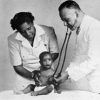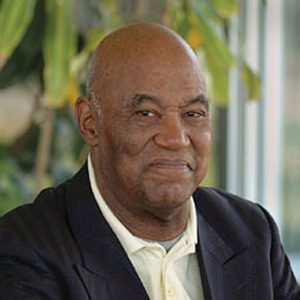calsfoundation@cals.org
Joseph Daniel McQuany (1928–2007)
Joseph Daniel McQuany was an Arkansas addiction counselor who became world renowned for his significant role in Alcoholics Anonymous (AA) and the creation of Recovery Dynamics, a substance abuse treatment model that grew to be utilized at hundreds of counseling sites throughout the United States and around the world and taught to thousands of recipients.
Joseph McQuany was born in Louisville, Kentucky, on November 16, 1928, one of three children of Kelly McQuany, who worked in the automotive industry, and Ada Beaty McQuany, a homemaker. McQuany described his family as poor but stated that he had a good childhood.
McQuany had a troubled early adulthood; he used alcohol excessively and lost numerous jobs. He and his first wife, who had two children, divorced after several years. After living with his parents off and on in Louisville, McQuany decided to seek opportunity outside of Kentucky.
McQuany traveled to Arkansas in 1958 on a trip to Little Rock (Pulaski County) to visit his sister Doris Ada McQuany Norman. At Norman’s church, McQuany met Loubelle, his second wife, to whom he was married for forty-eight years. For the first couple years of the marriage, he was drinking heavily and often abruptly left home. McQuany decided to stop drinking alcohol and get help on March 10, 1962.
During a couple of alcohol-induced trips to the Arkansas State Hospital, McQuany had been introduced to AA in a meaningful way. Impressed with the AA meetings, he tried to continue participation after discharge but had difficulty due to the racism and segregation of the time. Finally, a local AA group allowed him to attend with stipulations that he not come to the meetings early, drink their coffee, or hang around afterward.
McQuany is often credited with being the first African American to attend AA in Arkansas, and he was among the first to attend in the entire American Southwest. In the 1960s, he was reported to have co-founded the first Black AA meeting in Little Rock, located at Wesley Chapel United Methodist Church near Philander Smith College. He held AA meetings and educational workshops at Serenity House (the treatment center he founded) in Little Rock, which became so popular that the center had to be moved to a larger site in Little Rock, which he also co-founded. This became the well-known Wolfe Street AA Center, still in existence in the twenty-first century. He was cited in Heroes of Early Black AA as the most important Black leader in early AA history and one of the most influential teachers of the second generation of AA.
McQuany’s other accomplishments were numerous. He produced Big Book study education tapes and traveled the world with a partner presenting the information to hundreds of thousands. He established the Kelly Foundation, a nonprofit organization committed to substance abuse education, and wrote two books, The Steps We Took (1992) and Carry This Message (2002). His Serenity House facility was among the first in Arkansas that opened a section exclusively to treat women for substance use. He was chosen as the closing speaker at the Eighth International AA Convention, which was also a celebration of AA’s Golden Anniversary in 1985, having 44,000 people in attendance.
McQuany died on October 25, 2007, of Parkinson’s disease. He was posthumously inducted into the Arkansas Black Hall of Fame in 2008.
For additional information:
Chestnut, G. Early. Heroes of Early Black AA: Their Stories and Their Messages. Scottsdale, AZ: BookPatch LLC, 2017.
Joseph Daniel McQuany. Kelly Foundation. https://kellyfdn.org/team/joe_mcquany/ (accessed January 4, 2023).
Antimoore Jackson
University of Arkansas at Pine Bluff







This is a very interesting article about a person who contributed so much to substance use problems. A true pioneer who used his own experience with substance use problems and racism to improve the lives of others. This article is a great teaching tool for new professionals in the substance use helping profession.